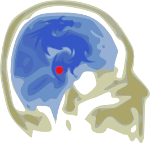
We came to this watery place by way of a long coast, and then mountains that made the engine of my car ring like an omen. Two weeks we traveled by day light, and then scrambled to find shelter and food and rest by night fall. As with many travelers from a country full of false and neon-blinking riches, all clearly marked, we must have passed a hundred less apparent restaurants before our eyes and appetites became acclimated to understand them as food. Not to mention our pocket-books. In these last weeks we have likely paid enough for three or four savvy travelers our size to have come the same distance. These are the lessons we learn along the way, God willing.
And then suddenly we were at the end of our journey here. We snuck down into this valley whose residents refer to as the belly button of the earth. A place the indigenous languages only allow a person to come home to. A long ago collapsed volcano filled with water that humans have eventually rendered unpottable. And herein begins my tome that I dedicate to the courage it took to leave the comfort of the life I left, and the future that pulls me like an invisible magnet.
There are three waters we use to wash our food before eating it.
The first is the water from the tap, which cleans away the visible dirt. Then there is filtered water, that we add a lemon grass and grapefruit seed extract amendment to in order to kill the dirt and organisms that are not visible, but that will render the western gut useless for weeks if taken commando. Finally there is the bottled water that we use to wash off the taste of the amendments we added in the last step. At that point, the veggies we have purchased are ready to be made into salsa, or salad.
The water comes from the inverted volcano whose waters seep slowly out through underground vents. Sewerage used to be dumped directly into the river, which created a 2-3 foot mat of cyanobacteria on it's surface, giving it a picturesque glean from a distance. Some years ago, in the interests of making the water and lake more attractive to visitors, the sewerage started being treated before being placed into the lake, and chemicals were added that would kill of the thick bacterial mat.
This die off apparently sunk to the bottom of this 1000 meter deep lake, and subsequently plugged the vents that were maintaining it's level at something resembling an equilibrium during the rainy season. Although most of the indigenous population, knowing the fickle humors of these waters, are smart enough to post their villages on higher ground, the gringos who like their shit all up in there at lakeside with the view are loosing the restaurants, houses, and cafes they built as the water rises – 25 feet in the last 2 years alone.
On our way to the place we are calling home for a month, we passed one such house, half submerged, it's walls still clearly painted with the yellows and oranges suggesting an east-indian flare. The blue eyes of shiva still visible above one of the doorways, looking into deep waters, and at floor tiles that probably cost a fortune to bring here.
We really wanted to be home when we got here.
We wanted this place to be one that sustains us and to commune with the people here and to grow a new community. The place we left was feeling broken, and sinister, and we were feeling watched and preyed upon by the powers that are hopefully soon-to-be has beens. The jury is still out, but I am coming to terms with the probable likelihood that we will not find the Xanadu that we were looking for here, and that the act of looking for such a thing in this place that 'belongs' rightfully to it's indigenous inhabitants might be, of itself, a tainted thing. There is a possibility that at best we might become a less invasive version of our fore-bearers, and at worse we will be indistiguishable. Or maybe there is a third option: to see how the gringos here have contributed to this place and it's people in ways that are not visible to me now. And so this is my prayer - to always seek the third invisible option when my head seeks a polemic.
One has to have hope in this world.
And so I begin this ditty, not loosing my stubborn if naïve hope that something good can eventually come of this. That there is a 'belonging' here for us that is respectful and that contributes. I know that in recounting my experience, I am being joined vicariously by those of you who would have loved to have come with, but could not. I pray that in these travels and in my writings I am able to bring you with in spirit, and that I am able to exist honorably and grapple with this journey humbly as I know you would have wanted to.
